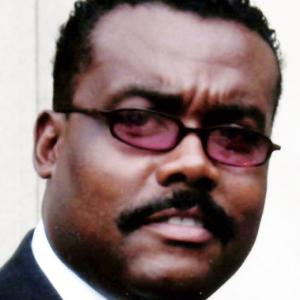
Leroy Worth
Education:
Postdoctoral Studies in Biochemistry '94
Advisor: Paul Modrich
PhD in Chemistry '90
University of Maryland College Park
BS in Biochemistry '83
Fayetteville State University
Leroy has worked at the NIH/NIEHS since 1994, starting out as a Staff Scientist. He currently holds the position of Scientific Review Officer where he does the initial scientific and technical merit review of grant applications and contract proposals submitted to the NIH.
How I Came to Science
As a kid, I would badger my mother, always asking why things happened. She told me I would have to start reading to figure it out. At the time, my mother was taking night classes (anatomy/physiology) and I started reading one of her chemistry books—science just made sense to me. In college, I studied biochemistry at Fayetteville State, and then went to the University of Maryland to get my PhD in Chemistry. But it was during my postdoc, in Paul Modrich’s lab at Duke, that things came together. Paul liked chemists because we could quickly synthesize things—right off the top of our heads. But I liked being in Paul’s lab because the field of biochemistry opened my eyes to the world at the molecular level.
Landing in Biochemistry
My route to biochemistry is interesting. In grad school, I’d talk to people about my interests and was told Paul Modrich would be a great person to contact. I came to Durham, liked his research, philosophy, the camaraderie in the department, and Paul’s connections. Everything at Duke was first-rate—I interacted with some really bright scientists and the grad students and professionals that didn’t stay at Duke, went on to do some amazing things.
And with Paul, it wasn’t always science—we’d discuss Duke Basketball along with an M13 phage. The science and sports were heaven for me.
Working at the NIH
My current focus is on DNA repair—working in genomic stability and error correction. And at the NIH, I’m trying to translate research findings into curing human disease through biological pathways. I primarily help researchers who work with housekeeping gene/pathways to help package their funding proposals and refer them to institutes that are the most closely aligned with their science. Moreover, when applicable, I often consider exploiting environmental exposure and how this would better translate findings in terms of human health.
My Impact
I can’t think of one specific event but there have been several initiatives I've help spearhead on behalf of the NIEHS/NIH including and not limited to: efforts surrounding the gulf oil spill and research studies that examine the human effects of affected coastal communities following the disaster, endeavors interrogating mitochondria dysfunction and nuclear crosstalk in response to exogenous insults and disease susceptibility; and pioneering studies examining how these insults drive reprogramming as it relates to epigenetic modifications—mainly methylation changes through the Toxicant Exposures and Responses by Genomic and Epigenomic Regulators of Transcription (TaRGET) Program. This along with directing the next generation of researchers in securing NIH awards and reviewing other governmental agencies and their science has been my ultimate reward.
What I Love About My Current Job
I love that I’m always reading about cutting-edge science and can continue on my quest to answer the question of why. I have access to a trove of publications at the NIH, so every morning I get up early and answer questions I have, and if things don’t fit, I ask more. I then formulate and distill ideas into something I can pursue. When I come to the office, I talk to people—using them as a sounding board. It’s having the ideas, probing individuals, then asking questions.
In the Future
I would like to be a Provost so I can recruit the next generation of scientists.
Advice for New Scientists
Put yourself in an uncomfortable place—it will help you ask the tough questions and do the hard work. Today, everyone wants a quick fix, but you really have to look at things over time and pay attention to what’s happening around you.
The Duke Network
My connections at Duke are what started my career. I was told if I worked in Paul’s lab, I’d be set—and it’s been so true. To this day, I’m close with my fellow researchers, especially those in my lab.